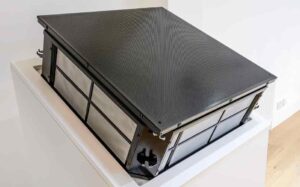Safety study of propane in small splits
3rd January 2014 FRANCE: A new article in the International Journal of Refrigeration looks at the results of a recent study into the safety of R290 in small split system air conditioners.
FRANCE: A new article in the International Journal of Refrigeration looks at the results of a recent study into the safety of R290 in small split system air conditioners.
Even before the new European F-gas revisions pledged Europe to a phase-down of HFCs – with the rest of world jockeying to follow suit in the future – air conditioning manufacturers have been moving away from R410A in small split systems. With Europe now additionally looking to ban the use of HFCs with a GWP greater than 750 in small splits, the move towards flammable alternatives will be accelerated.
Japan seems to be moving in the direction of the so-called “mildly flammable” R32 while some manufacturers in countries like China and India have gone for distinctly flammable hydrocarbons – propane in particular.
Propane (R290) is particularly attractive due to its negligible GWP, favourable system performance and relatively low cost. However, it raises some questions due to its flammability.
These questions were faced in a recent project funded by the Ministry of Environmental Protection of China and now the subject of an article in the IIR’s International Journal of Refrigeration
Investigations into the flammability hazards of using R290 in room air conditioners found that the flammable range of a release of R290 is only located within the close locality of the indoor unit, implying that only sources of ignition present in the immediate vicinity of the indoor unit have the possibility to ignite a refrigerant leak.
It also found that it is only possible for ignition to occur when the leak mass flow rate is extremely high and there are some means by which the release can be diffused to a sufficiently large flammable volume. In the event of ignition, the maximum overpressure within the room is about 6.5 kPa, which it found “was insufficient to damage doors or windows.”
The most dangerous scenario is if R290 is ignited during the leak process and continuous burning of the refrigerant occurs. In this situation, it is feasible that the secondary event of the plastic casing of the indoor unit could be ignited. Researchers found that if this occurs, a lot of smoke can be generated which can have a significant impact on personal safety of room occupants.
If an external fire was to engulf the air conditioner charged with R290, the total heat release of the burning indoor unit may increase by about 12%, compared to one charged with no refrigerant. The heat release is about 1000 kW but it was observed that the refrigerant piping joints can give way soon after the indoor unit is ignited, acting as a sort of pressure-relief device, leading to a release of refrigerant and avoiding a dangerous build-up of high pressure.
The article can be downloaded here.







